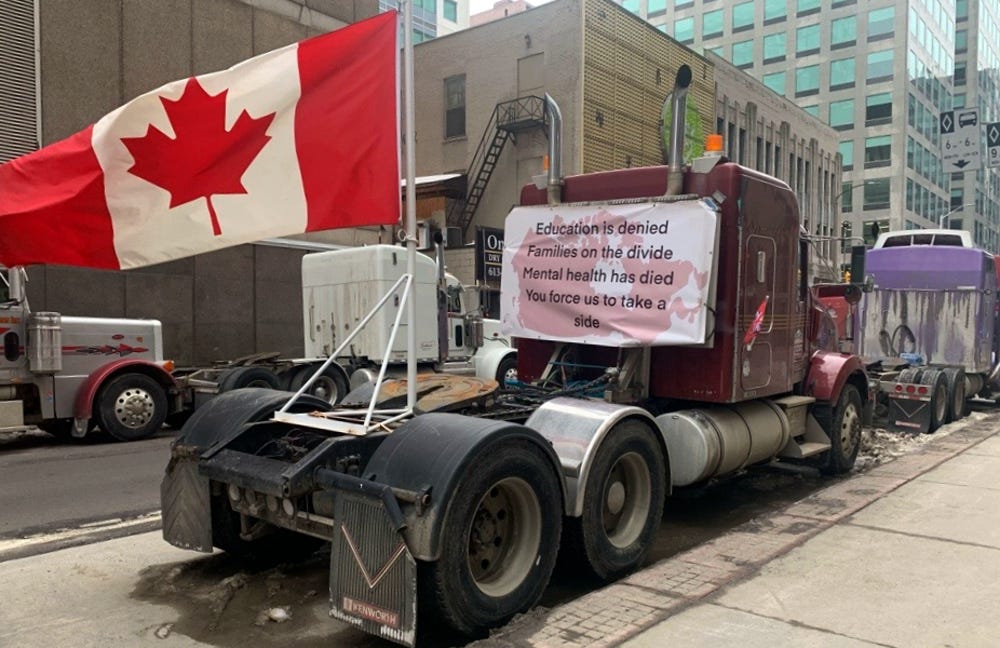The Biggest Flag I Could Put on There (Part 1 of 3)
'My wife and daughter were both in university, and both were getting kicked out because of the mandates.'
Just prior to the cross-border vaccine mandate taking effect, Clarence Penner had hauled a pair of empty sand cans down to the Texas panhandle. “They're basically two big boxes on my trailer,” he explains. “For the oil fields. There’s a hopper they put sand into, and then it pours out the bottom.”
Clarence lives just north of Winnipeg and has been a cross-border trucker for twenty years, his entire working life. He’s typically away from home for two weeks at a stretch, although an Alaska run can extend to twenty-one days. After delivering the cans, he asked his dispatcher to “just stall me out here. There’s no need to rush back.”
But after thinking things over, he concluded “I might as well just go to Ottawa. I can’t truck, anyways, which was my side of it. But what really motivated me was my wife and daughter were both in university, and both were getting kicked out because of the mandates.”
On the return journey to Canada, Clarence delivered a power generator to Grande Prairie, in northwestern Alberta. “They managed to unload me on Sunday,” he remembers. “I passed the Convoy coming back, rushing back to Winnipeg to get my truck ready.” By then, his 19-year-old daughter had designed a large sign for the back of his wine-coloured Kenworth, and had had it professionally printed. Superimposed over a map of Canada, the text read:
Education is denied Families on the divide Mental health has died You force us to take a side
“It’s my daughter’s own words,” he says. “Then they went and bought a big Canada flag, the biggest flag I could put on there, that wasn’t going to drag and touch my wheels. I got my brother to build a flagpole. And by Tuesday noon, everything was on the truck and I went to join the Convoy.”
He expected to sign up at the Flying J gathering spot, but it was impossible to get in, “so you just jumped on, and you were a part of it.” Hours later, when the trucks stopped in Kenora for the night, “I find out everybody’s like me. They just joined in, and nobody’s in charge. You didn’t feel out of place at all” because everybody was in the same boat.
“I’d never been to any protest whatsoever,” says Clarence, who was forty-one at the time. “Before or after. I’m not a guy that likes publicity, I’m very much a loner.” En route to Ottawa, he met one of his cousins, plus a couple of other acquaintances, “I had no idea they were there, so it was quite interesting.”
The magnitude of public support for the Convoy was “absolutely not what I was expecting,” he says. Starting in Winnipeg, “it just blew me away.” On the second day, a few hours after they’d departed Kenora, the Convoy passed through Dryden. “There was a pizza stand at the lights,” he remembers. “They had five, six people. Whenever the light turned red, they just ran down the row of trucks” passing full-sized pizzas through the windows. “The treatment you got. It’s like Why? How? All I’m doing is driving to Ottawa.”
That evening, when the Convoy stopped overnight in Thunder Bay, Clarence was one of the first trucks to pull into a large, plowed field. A nearby racetrack “held a fraction of the trucks,” he says. “That’s where they served the food.” He’d barely gotten parked before “a guy came by in a pickup truck with a whole pallet of windshield washer fluid. He brought me three jugs. I told him I had some, but he said, ‘Take them, just take them.’ That was the atmosphere there.”
When the Convoy divided in two the next morning, Clarence opted for the southerly route. Fellow truckers spent the night in Cochrane, while his group gathered in Sault Ste Marie. On the outskirts, he remembers a “guy was standing on the side of the road giving us a soldier’s salute as we were driving by. That’s when it struck me that we were being treated almost as if we were going off to war. It really touched me.”
Pulling into that city was memorable. “I have no words to tell you about the feeling you got,” he says. “It was like you were the only guy in town and they were all expecting you. Such a lively atmosphere, just on fire. The amount of people on the sidewalks, cheering, and trucks honking and flashing lights. I had to drive through there twice just to enjoy it.”
As he parked his rig at a truck dealership, he remembers,
there’s two or three minivans pulling into the yard. They’re shuttling you to the food. The natives had an aboriginal building on the other side of town, where all the food was set up inside. It’s all hot, just steaming. Tables of food, different kinds of meats. You just walk by with your plate and take as much as you want. And they had tables set up, so you got to sit and eat. And they’d come and join you at your table. It was just unbelievable, the atmosphere and hospitality.
The next evening, near Sudbury, he recalls seeing a double overpass that he thinks included a train bridge. At first, there were only a couple of Canadian flags,
In my mind, it painted this picture of where we were in Canada. Everybody's hiding. And then, as I came around the bend, the bridge kind of separated, and the other side was just packed with people.
That did something to me. That's exactly what Canada was, right there. We were all hiding, and now we’re coming out. It gave me goosebumps.
next installment: Here’s This Lady Running at Me






How dare the ruling thugs think they can divide us!